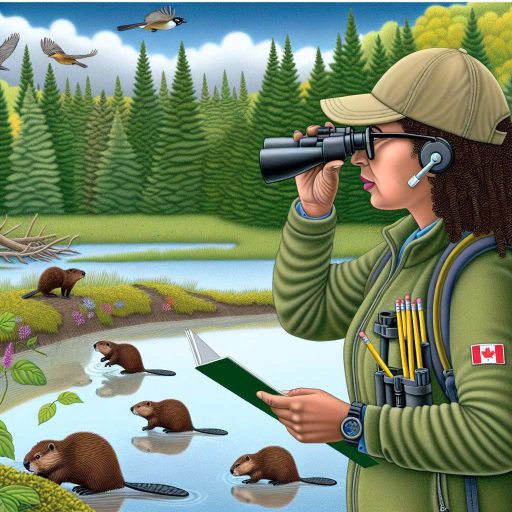Government Environmental Agencies and Their Role in Ecological Research
Introduction to Government Agencies
Government environmental agencies play a crucial role in ecological research.
They focus on protecting natural resources and promoting sustainability.
These agencies conduct research to inform policy and decision-making.
Additionally, they provide valuable data to scientists and researchers.
Key Agencies in Canada
Several key agencies operate in Canada to oversee ecological matters.
- Environment and Climate Change Canada (ECCC) leads federal initiatives.
- Fisheries and Oceans Canada (DFO) manages aquatic ecosystems.
- The Canadian Forest Service (CFS) focuses on forestry research.
- Parks Canada conserves national parks and historic sites.
These agencies collaborate on various ecological projects.
They also partner with universities and community groups.
Research Funding and Support
Government agencies provide essential funding for ecological research.
Grants support studies on biodiversity, climate change, and habitat preservation.
For example, the ECCC offers financial assistance for innovative projects.
Such funding enables researchers to address pressing environmental issues.
Moreover, it fosters collaboration among scientists across Canada.
Data Collection and Monitoring
Data collection is a primary function of these agencies.
They monitor air and water quality, wildlife populations, and ecosystems.
This data informs conservation strategies and environmental policies.
Regular assessments help track changes over time.
Consequently, they aid in identifying trends and potential threats.
Public Engagement and Education
Government agencies engage the public in ecological matters.
They conduct outreach programs to raise awareness about conservation.
Workshops and seminars promote sustainable practices among communities.
Additionally, they provide educational resources for schools and organizations.
This engagement fosters a culture of environmental stewardship.
Future Directions in Ecological Research
The role of government agencies continues to evolve as ecological challenges grow.
They are now focusing on climate resilience and adaptation strategies.
Furthermore, agencies are investing in technology for monitoring ecosystems.
Unlock Your Career Potential
Visualize a clear path to success with our tailored Career Consulting service. Personalized insights in just 1-3 days.
Get StartedThe integration of citizen science is also on the rise.
Through partnerships, agencies enhance research capabilities.
Non-Profit Organizations Focused on Conservation and Sustainability
Importance of Non-Profit Organizations
Non-profit organizations drive meaningful change in conservation efforts.
They engage communities in sustainable practices and education.
Furthermore, they preserve various ecosystems across Canada.
Leading Conservation Non-Profits in Canada
Several notable organizations contribute to ecological conservation.
The Nature Conservancy of Canada protects vital habitats nationwide.
Wildlife Conservation Society Canada focuses on wildlife and their habitats.
Additionally, the David Suzuki Foundation promotes sustainable environmental practices.
Volunteer Opportunities
Many non-profits offer volunteer programs for ecologists.
Volunteers participate in field research and conservation projects.
This hands-on experience enhances their practical skills and knowledge.
Partnerships with Universities and Colleges
Many organizations collaborate with educational institutions.
These partnerships promote research and student involvement.
Students gain invaluable experience while contributing to conservation efforts.
Impact of Financial Contributions
Financial donations significantly enhance conservation projects.
They support scientific research and awareness campaigns.
Moreover, funding helps maintain and restore critical habitats.
Research Institutions and Universities with Ecological Programs
Prominent Research Institutions
Canada boasts several renowned research institutions dedicated to ecological studies.
These institutions contribute significantly to ecological research and policy development.
The Canada Centre for Inland Waters conducts extensive freshwater research.
Environment and Climate Change Canada offers multiple research opportunities for ecologists.
Additionally, the University of Toronto’s Department of Ecology and Evolutionary Biology focuses on a variety of ecological disciplines.
Leading Universities with Ecological Programs
Numerous Canadian universities provide exceptional ecological programs.
McGill University offers innovative programs in ecological sciences.
The University of British Columbia features a strong focus on environmental science and ecology.
University of Alberta engages students in impactful ecological research.
Students at these institutions explore diverse ecological topics, from conservation to climate change.
Research Opportunities for Ecologists
Various research opportunities are available for aspiring ecologists in Canada.
Field research provides hands-on experience in ecological studies.
Laboratory work complements field studies by analyzing ecological data.
Internships with governmental organizations or NGOs enhance career prospects.
Moreover, collaborative projects with other institutions broaden research horizons.
Funding and Resources
Funding opportunities support ecological research initiatives across Canada.
The Natural Sciences and Engineering Research Council provides grants for ecological projects.
Provincial funding programs also assist researchers and students in ecological studies.
Additionally, many universities offer scholarships specifically for ecology students.
These resources ensure that research goals can be effectively achieved.
Networking and Professional Development
Networking is crucial for ecologists looking to advance their careers.
Conferences, workshops, and seminars provide opportunities to connect with professionals.
Additionally, organizations such as the Ecological Society of America foster strong networks.
Joining professional associations enhances knowledge and career opportunities.
Engagement in community initiatives also helps build valuable connections.
Discover More: How Epidemiologists Use Data to Save Lives
Private Sector Companies Involved in Environmental Consulting and Management
Key Players in Environmental Consulting
Many private companies excel in ecological consulting across Canada.
These firms conduct environmental assessments and impact studies.
For instance, Eco-Logic Solutions provides comprehensive ecological services.
Greenlink Environmental Consultancy focuses on sustainability practices.
Both of these organizations aim to protect natural resources.
Furthermore, they assist clients in complying with environmental regulations.
Resource Management Firms
Resource management is another area where private companies thrive.
Highland Environmental specializes in habitat restoration projects.
They work closely with government entities and private stakeholders.
Meanwhile, Terra Firma is known for their land management solutions.
These companies deliver strategies to maintain ecological integrity.
Wildlife and Habitat Specialists
Wildlife consulting firms also play a significant role.
Wildlife Solutions offers assessments and permits for projects affecting wildlife.
Additionally, EcoWild specializes in conservation strategies for endangered species.
These companies support both wildlife preservation and community engagement.
Sector-Specific Environmental Services
Sectors such as mining and energy require specialized environmental services.
Mining companies often partner with Ecological Innovations for best practices.
This firm provides tailored ecological risk assessments and mitigation plans.
In the energy sector, Renewable Resources Management focuses on sustainable practices.
They help companies transition to greener energy solutions.
Importance of Interdisciplinary Approaches
Collaboration is vital among various ecological sectors.
Consultants often integrate science, technology, and stakeholder input.
This interdisciplinary approach enhances project outcomes and stakeholder satisfaction.
As a result, companies effectively address complex environmental challenges.
Ultimately, these interactions lead to sustainable development and conservation.
Explore Further: Opportunities for Geneticists in Canada’s Academic Sector
Ecological NGOs: Opportunities and Impact on Policy Making
Role of Ecological NGOs in Canada
Ecological NGOs play a crucial role in conservation efforts across Canada.
They advocate for sustainability and environmental preservation.
These organizations engage in policy advocacy at various government levels.
Furthermore, they conduct research to provide data-driven insights.
This research influences policy-making decisions significantly.
Opportunities for Ecologists within NGOs
Many careers await ecologists in ecological NGOs.
They can work in roles ranging from field research to policy analysis.
Program management positions also offer impactful opportunities.
Moreover, ecologists can contribute to educational outreach initiatives.
These roles strengthen community engagement in environmental issues.
Impact on Policy Making
Ecological NGOs impact environmental policies effectively.
They often collaborate with government agencies to influence regulations.
Their advocacy campaigns raise public awareness on critical issues.
By mobilizing grassroots support, they create a strong influence.
Additionally, they provide expert testimony during legislative sessions.
Examples of Influential Ecological NGOs in Canada
Several prominent NGOs lead the way in ecological advocacy.
- Greenpeace Canada has a strong focus on climate change initiatives.
- The David Suzuki Foundation emphasizes biodiversity and conservation.
- World Wildlife Fund Canada works on habitat preservation and restoration.
- Ecology Action Centre promotes sustainable practices in Atlantic Canada.
Challenges Faced by Ecological NGOs
Despite their critical roles, ecological NGOs face significant challenges.
Funding can be a consistent struggle for many organizations.
Political opposition may hinder their advocacy efforts.
Additionally, public engagement can fluctuate based on awareness.
Moreover, evolving environmental issues require continuous adaptation.
Discover More: Understanding Quantum Physics And Its Career Impact

Community-Based Organizations and Grassroots Initiatives in Ecology
Role in Conservation Efforts
Community-based organizations play a vital role in ecological conservation.
They empower local communities to engage in environmental protection.
These groups often conduct essential research and gather data on local ecosystems.
Consequently, they help address regional environmental issues effectively.
Types of Organizations
Various types of organizations exist across Canada.
Non-profits often focus on specific environmental concerns.
Grassroots initiatives mobilize communities for localized ecological action.
Additionally, educational programs raise awareness about ecological issues.
Examples of Notable Organizations
The David Suzuki Foundation focuses on sustainable living and biodiversity.
EcoAction Community Fund supports local environmental projects across Canada.
Additionally, the TIDES Canada initiative promotes community-driven solutions.
Across the country, these organizations drive impactful ecological reforms.
Engagement and Volunteer Opportunities
Community organizations offer numerous engagement opportunities for individuals.
Volunteering for local clean-up events fosters a strong environmental ethic.
Participating in workshops enhances knowledge of ecological issues.
In addition, internships provide hands-on experience in conservation work.
Impact on Policy and Advocacy
Community organizations significantly influence environmental policy development.
They advocate for stronger regulations that protect ecosystems.
By uniting community voices, they effectively lobby for change.
Furthermore, they ensure that marginalized voices are heard in policy discussions.
Delve into the Subject: Physics In Everyday Life And Its Practical Applications
International Organizations and Their Canadian Branches in Ecological Work
Global Ecological Initiatives
Many international organizations play a pivotal role in ecological efforts.
These organizations often have Canadian branches working on various projects.
Additionally, they collaborate with local entities for greater impact.
International Union for Conservation of Nature (IUCN)
The IUCN is a global authority on nature conservation.
Its Canadian branch focuses on biodiversity and sustainable development.
Moreover, it engages in research and advocacy across the country.
They support community-based conservation efforts.
- Habitat preservation projects
- Species recovery programs
- Training local organizations in sustainable practices
World Wildlife Fund (WWF)
WWF works globally to address environmental challenges.
The Canadian branch emphasizes protecting wildlife and habitats.
They implement various education and outreach initiatives.
Furthermore, they partner with Indigenous communities for biodiversity protection.
- Wildlife corridors establishment
- Forest conservation efforts
- Climate change adaptation strategies
United Nations Environment Programme (UNEP)
UNEP coordinates environmental activities within the UN system.
In Canada, it focuses on sustainable development goals.
Moreover, UNEP promotes environmental awareness and education.
They create programs tailored to local Canadian needs.
- Pollution prevention initiatives
- Environmental monitoring systems
- Policy development workshops
Conservation International (CI)
Conservation International works towards protecting nature for all life on Earth.
Their Canadian branch engages in innovative conservation methods.
They conduct vital research on ecosystem services.
This guides sustainable practices in various sectors.
- Protected area establishment
- Community-based resource management
- Corporate sustainability initiatives
Local and Regional Partnerships
Local organizations often partner with these international bodies.
Such collaborations amplify their conservation efforts.
They focus on community-level issues and solutions.
Moreover, these partnerships enhance local capacity for change.
- Hands-on training programs
- Research collaborations with universities
- Awareness campaigns targeting specific ecological issues
Ecotourism and Its Role in Promoting Environmental Awareness and Ecology Jobs
Defining Ecotourism
Ecotourism focuses on responsible travel to natural areas.
It aims to conserve the environment and improve local livelihoods.
This type of tourism encourages cultural exchange and environmental education.
Enhancing Environmental Awareness
Ecotourism plays a crucial role in fostering environmental awareness.
Visitors learn about conservation and ecological principles through guided experiences.
These experiences promote a deeper understanding of local ecosystems.
Moreover, they encourage tourists to advocate for sustainable practices.
Creating Job Opportunities in Ecology
Ecotourism generates numerous job opportunities for ecologists and related fields.
It fosters employment in areas such as wildlife management and environmental education.
Professionals like field guides and conservationists gain valuable work experience.
Consequently, these roles contribute to local economies and ecosystems.
Encouraging Community Involvement
Ecotourism encourages local communities to participate in environmental initiatives.
Communities engage in planning and managing ecotourism efforts.
This involvement strengthens their connection to natural resources and conservation.
Furthermore, it fosters a sense of pride in local heritage and ecosystems.
Impact of Ecotourism on Environmental Awareness
Ecotourism promotes a holistic approach to ecology and environmental education.
It creates sustainable economic opportunities and enhances global awareness of environmental issues.
Additional Resources
How to become an ecologist? | Conservation Careers




